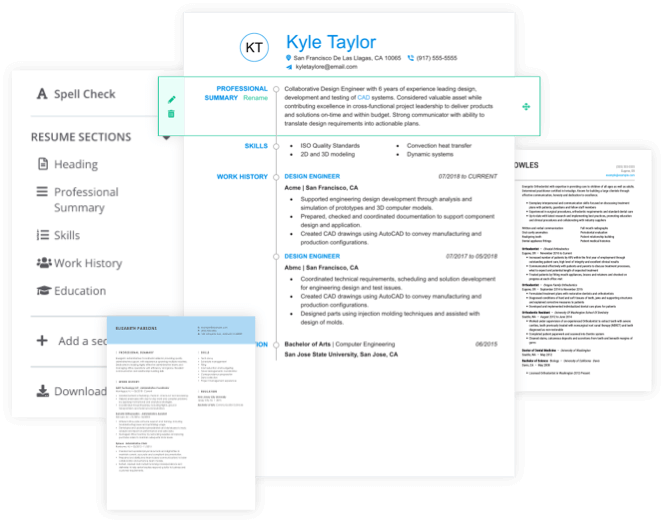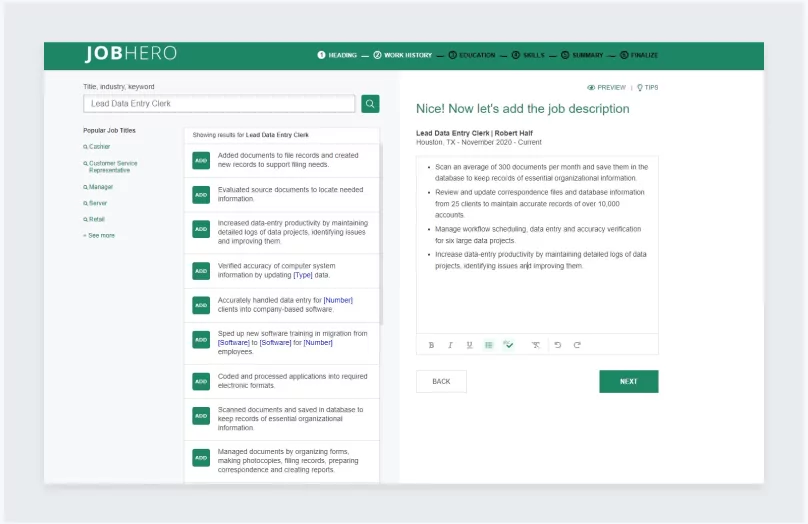- Featured in:

Mechanical site engineers, also known as field engineers, are responsible for making sure all machinery on a given project is constructed and installed correctly. Usually, these projects are commercial construction projects and involve HVAC systems. Mechanical site engineers can also find employment in the medical and manufacturing industries, as both of these industries require a lot of machinery. Mechanical site engineers spend a majority of their shift on the site of their current project. They are the engineers responsible for bringing the plans outlined in blueprints to life. This role is a full-time position that usually includes weekends off.
Mechanical site engineers delegate tasks to laborers, plumbers, masons, and lower-level engineering technicians. Since some projects are completed outdoors, mechanical site engineers have to prepare for the elements.
Need cover letter guidance? Add a cover letter to your resume using our cover letter formats how-to guide and add value to your resume.
Impress your future boss! According to a 2020 survey, most hiring managers read cover letters for candidates they’re considering interviewing before making their final decision. Make a cover letter that seals the deal with our professionally designed cover letter templates.
Mechanical Site Engineer Duties and Responsibilities
A mechanical site engineers duties and responsibilities vary slightly depending on the industry. We analyzed mechanical site engineer job descriptions to come up with the following list of core duties and responsibilities:
Analyze and Interpret Project Blueprints
Mechanical site engineers don't have to create blueprints often, but they do have to interpret blueprints created by CAD software on a daily basis. They can conceptualize which tasks need to be done in which order to make the blueprint a reality.
Facilitate Construction and Installation of Machine Components
While they don't do much of the actual building themselves, mechanical site engineers are heavily involved in the construction and installation of machine components. This can mean creating machinery from scratch or installing a component as part of a repair.
Test Machine Components for Functionality
Depending on one's industry, there are specific tests for each kind of machinery. It is the responsibility of the mechanical site engineer to run these tests before signing off on completion. If something doesn't perform as expected, he or she is responsible for diagnosing and fixing the problem.
Delegate Tasks to Various Project Employees
Mechanical site engineers are part project manager; they delegate tasks to laborers and technicians, providing guidance as these workers complete their tasks.
Ensure Project is Completed on Time and Budget
Project stakeholders hate when a project costs more time or money than was originally estimated. It is up to the mechanical site engineer to make sure all the mechanical aspects of the project are completed as efficiently as possible.
Mechanical Site Engineer Skills
Mechanical site engineers have a passion for solving problems and understanding the mechanics that make machines work. The following are the most common skills needed to succeed as a mechanical site engineer:
- Project management - planning out the size, scope, and resources necessary to complete a project
- Manual dexterity - using hand tools and conducting tests on machinery
- Problem-solving skills - diagnosing and addressing the causes of malfunctions
- Prioritization skills - looking at a big-picture plan and breaking down the order of operations necessary to make the plan happen
- Delegation skills - delegating tasks to laborers and technicians, providing guidance as these workers complete their tasks
- Communication skills - communicating with fellow engineers, technicians, and project stakeholders
Mechanical Site Engineer Education and Training
Mechanical site engineers need to have a bachelor’s degree in mechanical engineering to find a job. Coursework includes mathematics, project management, and the principles of engineering. They also have to earn their professional engineer license, which requires a 4-year degree from an institution accredited by the ABET, as well as work experience under a licensed engineer.
Mechanical Site Engineer Salary and Outlook
According to the national bureau of labor statistics, demand for mechanical engineers is set to rise 9 percent through 2026. The national median salary is $84,190. Those in the bottom 10 percent make below $54,420, while those in the top 10 percent make above $131,350.

Mechanical Site Engineer Resources
American Society of Mechanical Engineers
Founded in 1880, the American Society of Mechanical Engineers is one of the oldest and most prestigious organizations for engineering professionals. It offers amazing professional development opportunities, as well as a regularly updated newsletter with industry trends.
The Beginner's Guide to Engineering: Mechanical Engineering
This is an excellent read for those interested in how machines work, but who don't yet know much about the world of mechanical engineering. Author Mark Huber breaks down mechanical engineering concepts in a way that is easy to understand.
Accreditation Board for Engineering and Technology
This is the governing organization that determines if an academic institution's mechanical engineering program meets industry standards. Aspiring mechanical site engineers should check this site when deciding on a degree program.
Mechanical Engineering Reference Manual for the PE Exam
This book is the goto study guide for those looking to pass their licensing exam. It contains study material and practice questions to help you prepare for the exam.
Mechanical Site Engineer Resume Help
Explore these related job titles from our database of hundreds of thousands of expert-approved resume samples:




